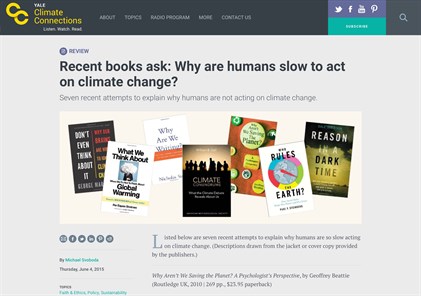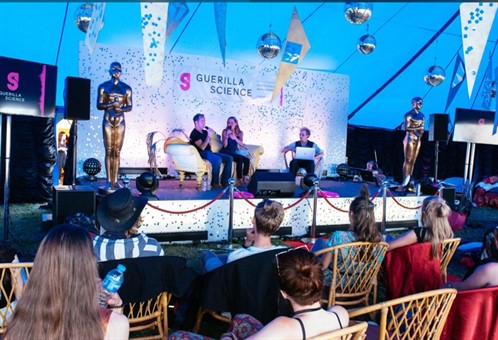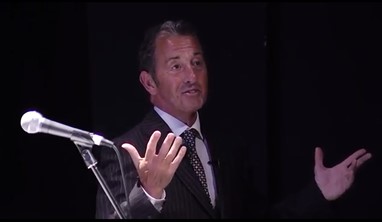Research Areas
His psychological research focusses on multimodal communication, deception, implicit cognition, prejudice, neurodiversity, and the psychology of climate change with over 120 academic articles in journals such as Nature, Nature Climate Change, Autism, Journal of Experimental Psychology, and Semiotica. He was awarded the Spearman Medal by the British Psychological Society (BPS) for ‘published psychological research of outstanding merit’ and the Mouton d’Or prize for groundbreaking multimodal research on deception.

I was invited to be a member of the steering committee for the new International Interdisciplinary Panel on Behavioral Change (in the context of climate change). The meetings have been hosted by the United Nations Environment Programme at UNESCO in Paris. Its brief is ‘to bring together the best specialists in the relevant domains to propose concrete measures for civil society to facilitate behavioral change for more sustainable, equitable, and desirable development.’
In the past few years, I have also presented my research on why we need to target implicit, automatic associations in the fight against climate change at the United Nations Conference on Climate Change, UNESCO, Paris, in July 2015, and acted as an external contributor to Unilever’s Leadership Vanguard. I have also given a number of keynote addresses on implicit racial bias at various high profile conferences throughout the U.K.
My research has been funded from a range of sources, including research councils (ESRC; British Academy), the EU FP7, charities (Leverhulme Trust; Nuffield Foundation; Equality Challenge Unit) and from commercial sources like Tesco and Unilever.
Selected recent conference presentations/major talks:
- I’ve worked with the British Academy on climate change, as well as receiving research funding from them, and presented my research on optimism bias and climate change at the British Academy Summer Showcase 2018, and at a British Academy event on climate change at the Latitude Festival in 2019. I will be speaking at a B.A. event at the Buxton International Festival in summer 2020 on the theme of ‘taking responsibility for climate change’.
- Beattie, G. (2019)The connection between iconic gesture and speech.Keynote at the launch of the new International Multimodal Communication Centre at Oxford School of Global and Area Studies (OSGA), University of Oxford, October 2019
- Beattie, G. (2019) How to avert a climate catastrophe, with Professors McGlade (Chair) Pope and Short (Gresham College/ Met Office/UCL), Museum of London, on behalf of Gresham College, September 2018
- Beattie, G. (2018) Revealing the secrets of body language. Funzing Talks, London, May 2018
- Beattie, G. (2018) How spontaneous gestures connect to thinking. Museum of London, on behalf of Gresham College, April 2018
- Beattie, G. (2017) The psychology of celebrity. Guerilla Science: Secret Garden Party Debate, funded by the Wellcome Trust, Huntingdon, Cambridge, July 2017.
- Beattie, G. (2017) Rethinking body language: How hand movements reveal hidden thoughts. Psychology Teacher National Conference, London, July 2017.
- Beattie, G. (2017) Hidden Thoughts: Do Your Hand Movements Reveal More About You Than You Think. European Conference on Psychology and the Behavioural Sciences, IAFOR, Brighton, July 2017
- Beattie, G. (2017) Visible thought. Techkriti'17, The Annual Technical and Entrepreneurial Festival of IIT, Indian Institute of Technology Kanpur, India, March 2017

- Beattie, G. (2016) Optimism bias and climate change. Annual Conference of the Semiotic Society of America, Delray Beach, Florida, October 2016.
- Beattie, G. & McGuire, L. (2015) Breaking Bad: Why we need to target implicit, automatic associations in the fight against climate change. Our Common Future under Climate Change International Scientific Conference. United Nations Conference on Climate Change, UNESCO Headquarters, Paris, France, July 2015.
- Beattie, G. (2015) The Divided Self. International Academic Forum’s European Conference on Psychology and the Behavioural Sciences, Brighton, July, 2015.
- Beattie, G., Marselle, M, Litchfield, D. & McGuire, L. (2015) Why don’t we see the arguments for climate change? How cognitive biases affect processing of climate change messages. 21st Anniversary Conference of the Interdisciplinary Environmental Association. Puerto Rico, June 2015.
- Beattie, G. (2014) Our Racist Heart? An exploration of possible unconscious bias in employment in the UK. Asian Fire Service Association National Conference, Stoke-on-Trent, November 2014.
- Beattie, G. & McGuire, L (2014) Mobilizing the unconscious mind in the fight against climate change. 20th Anniversary Conference of the Interdisciplinary Environmental Association. Denver, Colorado, June 2014.

Some recent academic papers/books:
Full-text links of these publications available on the Edge Hill University Research Information Repository
- Beattie, G. & McGuire, L. (2020). The modifiability of implicit attitudes to carbon footprint and its implications for carbon choice. Environment and Behavior
- Yamaguchi, M. & Beattie, G., (2020). The role of explicit categorization in the Implicit Association Test. Journal of Experimental Psychology: General
- Beattie, G. (2018). Optimism bias and climate change. The British Academy Review, 33, 12 – 15
- McGuire, L. & Beattie, G. (2019) Talking green and acting green are two different things: An experimental investigation of low carbon choices. Semiotica, 227, 99-125
- Beattie, G., Marselle, M., McGuire, L., & Litchfield, D. (2017). Staying over-optimistic about the future: Uncovering attentional biases to climate change messages. Semiotica.
- Power, N., Beattie, G. & McGuire, L. (2017). Mapping our underlying cognitions and emotions about good environmental behaviour. Why we fail to act despite the best of intentions. Semiotica.
- Beattie, G. (2016) Rethinking Body Language: How Hand Movements Reveal Hidden Thoughts. London: Routledge.
- Beattie, G. (2016). How Donald Trump bullies with his body language. In D. Lilleker, E. Thorsen, D. Jackson & A. Veneti (Eds.), US Election Analysis 2016: Media, Voters and the Campaign. Bournemouth: CSJCC.
- McGuire, L. & Beattie, G. (2016). Consumers and climate change. Can the presence of others promote more sustainable consumer choice? The International Journal of Environmental Sustainability.12, 33-56.
- Beattie, G. & McGuire, L. (2016). Consumption and climate change. Why we say one thing but do another in the face of our greatest threat. Semiotica, 213, 493-538.
Implicit Prejudice
I have explored how unconscious prejudice can operate in everyday life and how it can impact on the selection of candidates for posts. This research suggests that if we really do want to do anything about racism in society, then we need to understand these implicit, unconscious processes and how to combat them.
Read more >Nonverbal Communication
For many years I have conducted detailed analyses of how speech and nonverbal behaviour act together in everyday communication. My research has shown how this can be crucial in the identification of deception and in recognizing that speakers may have implicit attitudes at odds with the attitudes they report.
Read more >Northern Ireland
I grew up at the 'turn of the road' in North Belfast and watched in the late sixties and early seventies my closely knit community, with both Protestant and Catholic mixed together, descend into that religious-based conflict of 'The Troubles'. As a psychologist I felt that I needed to try to understand how this could happen.
Read more >Psychology of Sport
So much of what happens in sport happens in the mind, and for that reason it is a fascinating subject for the psychologist. My work here has used a number of different approaches.
Read more >Sustainable Consumption
Between 2007 and 2012 I worked closely with Tesco through the Sustainable Consumption Institute at the University of Manchester developing psychological insights into consumer attitudes and behaviour. My research explored the implicit attitudes of consumers and used techniques like eye-tracking to investigate how consumers process environmental information, such as carbon footprint, on products.
Read more >“Iconic gestures provide us with a glimpse of our hidden unarticulated thoughts and therefore these movements can act as a window on the human mind”